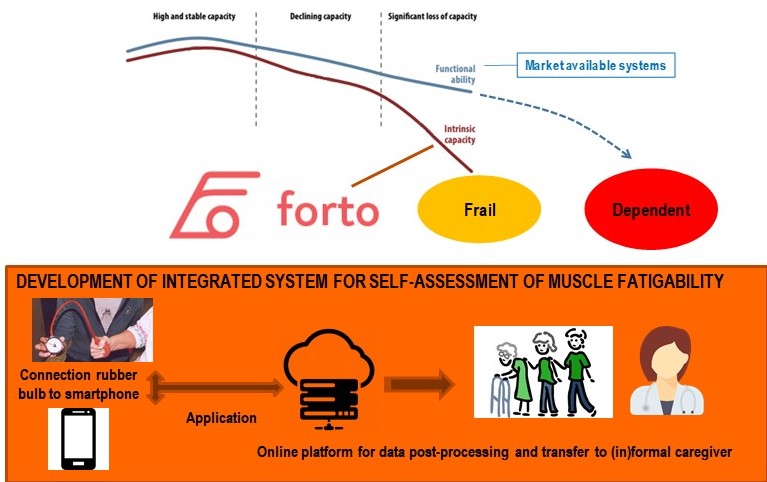Early detection of changes in intrinsic capacity is key for managing the preservation of the resources needed for older adults to adapt to health stressors that occur throughout their lives. Effective tools for monitoring intrinsic capacity are currently inexistent or bound to lab settings. At VUB, Bautmans introduced, refined and validated muscle fatigability as a direct and objective outcome parameter of the exhaustion component of frailty in elderly persons. FORTO 2.0 offers a commercial-grade muscle fatigability self-assessment system, with effective longitudinal data recording, prone to act as an early warning system for diminishing resistance to and delayed recovery from health stressors. End-users of all levels are involved, including older adults (primary), healthcare professionals (secondary), and health insurers (tertiary). A comprehensive dissemination plan has been defined, focused on interacting with patients, general practitioners, healthcare providers, policy makers, healthcare companies, the scientific community, and the general public.
Objectives:
Loss of intrinsic capacity is a health condition associated with ageing, rapidly growing in prevalence. It leads to loss of independence, putting significant pressure on social and healthcare structures, due to increasing demand for services and related escalating costs. Existing preventive solutions focus on detecting present symptoms like frailty and dependency. We propose a unique novel approach to measure the capacity to recruit available reserves, by means of a user-friendly device, mobile app, and progress monitoring and analytics platform. It can be used independently by older adults or in a supervised care pathway.
Expected Results and Impact:
We expect to enable primary end-users to evaluate and monitor of their intrinsic capacity, provide more detailed quantitative information to secondary end-users about their patients’ status as well as their changes over time in-between the regular visit, and offer cost savings in the long run by allowing citizens to live independently and be productive. At the end of the project we expect the FORTO 2.0 system to be ready for market introduction (Technology Readiness Level – TRL 7), with a business model based primarily on one-time purchase hardware, and software subscriptions aimed at connecting patients with HCPs.
Project partners
Partners involved in the project
- Project name: Evolving to an integrated smart self-assessment “Fatigability in Outcomes to monitor Resilience Targets in Older persons” measurement & monitoring platform (FORTO 2.0)
- Website: https://forto-aal.eu/
- Coordinator: Vrije Universiteit Brussel, Frailty in Ageing research group
- Duration: 30 Months
- Starting Date: 1/04/2021
- Total budget: € 2,133,220.78
- Public contribution: € 1,370,383.97
Contact:
Ivan Bautmans
E.: ivan.bautmans@vub.be
T.: +32 2 477 42 07

